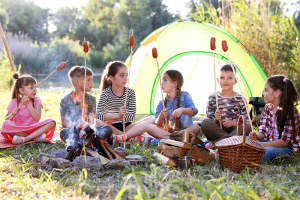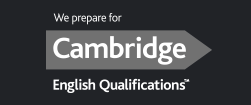Notícies
-
Beques Anglès curs 26-27
CONVOCATÒRIA JA OBERTA! · 30 beques anglès alumnes 3r d’ESO
-
RENOVACIÓ 2026 - Crèdit Fundae Empreses
Bonifica la FORMACIÓ D'IDIOMES de la teva EMPRESA!
-
Cursos SEMIINTENSIUS - De febrer a juny
Per als nivells/cicles B2 First i C1 Advanced
March article
Dilluns, 4 de Març del 2019‘Summer camp culture’ by Emma Hearle
We are all familiar with summer learning loss, summer brain drain, the slide, or whatever you want to call it. Many of us probably feel that kids don’t get enough physical activity during the summer months either. When schools lock their gates at the end of term, children gain a spring in their step – while, all too often, their parents' shoulders slump. How can youngsters be safely, productively and affordably entertained throughout the long summer holiday?
Americans in particular have a solution. With longer school breaks than Britain and typically less holiday leave for working parents, residential summer camps often provide a home-from-home. There's an incredibly strong culture of that in America and sending kids to camp is like the 11th commandment. In films (we all remember The Parent Trap!), such camps involve an expansive lake, a lack of electricity and things called s'mores – those delicious melted marshmallows sandwiched with chocolate between two biscuits – and poison ivy.
What you see in these all American camp movies isn’t far from reality. I have friends that spent university holidays working at probably the most famous of the American summer camps, Camp America. One told me the about dorm rooms with more bunk beds crammed in than you thought possible, the typical toasting of marshmallows while learning camp chants around the campfires and “horseback riding” through the forest. Camp business in America is worth 18 billion dollars with some 11 million children attending.
American-style summer camps have washed up on Aussie shores too and they’re really catching on, although in Australia they’re not quite as hardcore. Unlike the three-month long camps in The States, in Australia it's common practice for kids to attend just for a week or two. This doesn’t mean any less fun though and children can choose between boarding (staying onsite) or attending just during the day and take part in a range of activities like rafting, sailing and surfing.
UK parents are now learning the lingo, and more frequently turning to summer camps to keep their children occupied during the six weeks of British “summer” too. Some even pack them off to the States to sample the original experience.
Many camps in Britain focus on sport and adventure, where the A to Z of activities runs from archery to zorbing – the dubious pleasure of hurtling down a hill in a huge inflatable ball. For young adrenalin junkies, the increasing popularity of coasteering – which includes cliff jumping, swimming beneath sea cliffs and exploring rock arches – especially exciting in the UK with the many kilometres of coast and beautiful, rugged islands such as the Isle of Man or the Isles of Scilly. There are plenty of less boisterous options too, including art-focused camps and academic programmes. Day camps are also increasingly common in England where at some tweens can take mobile app design, video game development and robotics classes, while teens can learn programming.
Meanwhile other camps enable children to split their time between creative activities and physical adventure. Some British camps see youngsters perfecting their dance moves every morning, then trying out anything from motorbiking to fencing in the afternoon. There are also filmmaking and photography courses for those more creatively motivated.
If it’s a language you want your kids to get their teeth into, camps that teach French, Spanish, German and Chinese are increasingly popular in the UK too. Like here in Spain, there is nothing more valuable than your children practicing and perfecting their English while making friends and having fun too. With the Spanish summer holidays being no less than three months long (how jealous I’d have been knowing this when I was at school!), parents may not want children to go abroad to learn English but have them doing so closer to home. There are multiple day and residential camps that run in English with native teachers and leaders at camps specialising in sports, music and art while also providing English classes for part of the day.
…
For your own taste of summer camp culture, please contact Cambridge School by email (granollers@cambridgeschool.com) or by phone (tel. 938702001) and find out everything you need to know about our offer on summer camps in English for children.










 Tel. 93 655 05 58
Tel. 93 655 05 58 Enviar WhatsApp
Enviar WhatsApp



![[...]](https://www.cambridgeschool.com/xtra/imgs/loading.gif)